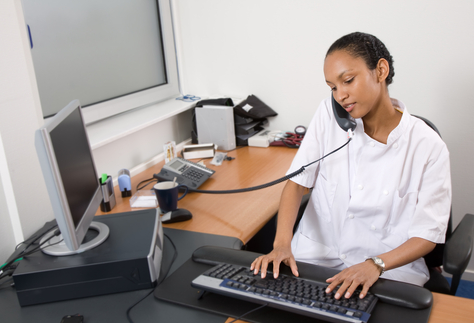

Working in the medical field can be very rewarding, even if you don’t work directly with patients. You’re part of a patient care team, helping folks to have happier, healthier lives. Unfortunately, being in the medical office environment often means exposure to a variety of illnesses.
Even if you don’t work in direct patient care, you’re still susceptible to many illnesses patients bring into the office. As such, it’s important to take certain steps to avoid those illnesses. While the doctors and nurses have all had special training for staying germ-free, office staff don’t always get the important information.
Here are some tips you can use to try to avoid illness when you work in a medical office:
- Know when germs are most likely to be spread.
You might decide to take a few moments and think about your daily routines, and about the potential situations in which germs and the illnesses they can cause might be spread in your medical office.
For example, let’s say you work in reception. When a customer comes in with the flu, there are several instances where you might be exposed to her illness:
- When she handles the clipboard to verify her insurance information and address, or to fill out other forms. The clipboard, document, and even the pen might have been exposed.
- When you receive the chart after the patient has been seen by the nurse or doctor. Passing documents are a common method of passing germs.
- When you pass the patient their appointment card for their follow-up visit.
There are examples for any and every job function in a medical office. Someone in billing might be exposed to germs when using a shared phone. Someone who handles patient records may be exposed to illness when handling charts or other records. Your exposure depends greatly on your routines.
- Put hand sanitizer to work for you.
In most medical offices, nurses and doctors are constantly using hand sanitizer. Just because you’re in the office staff area doesn’t mean you shouldn’t do so, as well.
Think of all of those potential interactions you listed in the first tip. Before and after each of those, you should consider using hand sanitizer to get rid of those potential germs and avoid illness.
The same goes for washing your hands. Any time you have the opportunity, you should probably think about doing it.
- Replenish the office air.
This is easier to do in some offices than it is for others. However, one of the best ways to help avoid illness and get some of those germs out of the office is to simply air it out for a bit. Even opening a window for about five minutes during the middle of the day can clear some of it out.
Some medical buildings are equipped with air handlers that will filter the air, and so this may not be as much of a concern depending on where you work.
- Keep it clean.
Keeping your desk clear of clutter, wiping it down once or twice a day, and regularly emptying your trash bin can all help to get rid of germs. Even if you have personnel that regularly clean the office, doing these simple cleaning tasks during the work day can help to reduce your risk of contracting an illness.
- Watch out for the telephone.
Shared telephones are a breeding ground for germs. Keep some antibacterial wipes at your desk, and regularly wipe down a phone before you use it – especially if it’s a phone you share with other personnel.
- Don’t eat in the office.
This can be a tough one, and it may or may not be one you want to use. When you eat in the office, you expose your food to all of those airborne pathogens. Rather than breathing them in, you can actually ingest them, bypassing some of your body’s natural defenses.
It’s not always possible to go somewhere else to eat, of course. If your medical office has a designated kitchen or break room, try to confine your eating to that room. Even having your snacks in there may be a good idea.
In some ways, working in a medical office can feel like grade school. Someone’s always catching a cold or passing around the flu. If you follow some of these tips, however, you may be able to reduce your risk of illness.









